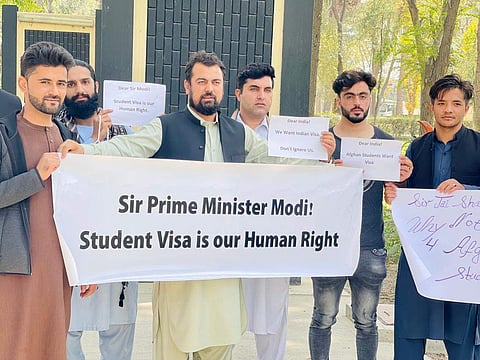

The cancellation of the e-Emergency X-Misc Visa for students from Afghanistan who were enrolled in Indian universities last month was a big blow to the hopes of students who wished to pursue their higher education in India. And now, with the Taliban banning girl students from attending universities in Afghanistan, the academic future of these students is all but lost.
"We have been appealing to the Indian government and the embassy for 15 months to grant us visas so we can return to India and complete our studies. However, not only were our applications for the e-Emergency X-Misc Visa cancelled, but we are also now not allowed to speak with members of the embassy. We have been left in the dark," Shams Danish, an Afghan student at Goa University, tells Edexlive. Physical classes in Indian universities began in February this year after a gap due to the pandemic. However, with the Taliban taking control of Afghanistan, students from the country were not granted visas. Danish adds that Goa University was not able to arrange online classes for a few students, and therefore, he has lost an entire academic year. For more than 2,000 Afghan students desperately searching for avenues back into India to complete their education, the struggle rings true. While some have not been granted degrees because they could not write their final year exams, others have been forced to drop a couple of semesters.
For girl students, the situation is not only "hopeless", but also mired in danger. With strict impositions of the Sharia (Islamic Law), women have been barred not only from educational institutions but also from working with NGOs now, among other restrictions. This erasure of women from public life sparked protests in the country last week, with boys also boycotting their classes and exams in solidarity with their women counterparts. Taliban's Minister of Higher Education Nida Mohammad Nadim told the Afghan media that the ban on women in universities, as also in middle schools and high schools was "necessary" to avoid the "mixing of genders" and because some subjects being taught in educational institutions "violated the principles of Islam." In such a scenario, pursuing education abroad is perhaps the only way out for girl students. The daughters of Muhammed Suhail Shaheen, the head of Taliban's Political Office in Doha, Qatar, attend school in Doha, as he admitted to a British television news channel. Shaheen added that his daughters attend school "because they wore hijabs." The Taliban has already made it compulsory for women to cover themselves up from head to toe, including their face, when they step out in public.
On the condition of anonymity, women students from Afghanistan, who spoke with Edexlive, expressed despair. "We don't see any point in requesting the Indian government anymore. We have done it for a long time, and we would try again if they would have been of any help. But right now, we are extremely hopeless," a girl student says.
A student who gained admission into the Noida International University in the Master of Public Health Programme, online classes were conducted for the first two semesters of her two-year course. Now, she is about to begin her third semester, but she has never been to India. "I have only attended online classes. They are not the same as studying on campus. This is not good for us because the internet connection is not stable in Afghanistan. We face many difficulties regarding our education and we want to take our visas, and come to India and complete our studies," she says. This student did her bachelors from the Ghalib Medical University and has taught at a college for a year. But now, given that her father was a member of the government that was toppled by the Taliban, even leaving her house is a dangerous prospect. "I have given up teaching. I cannot go outside. With no visas, all I have are online classes, which are inconsistent and insufficient," she adds.
